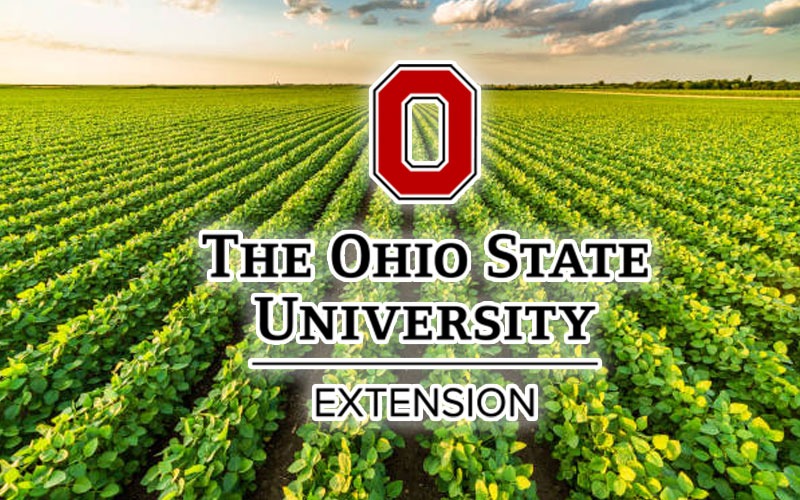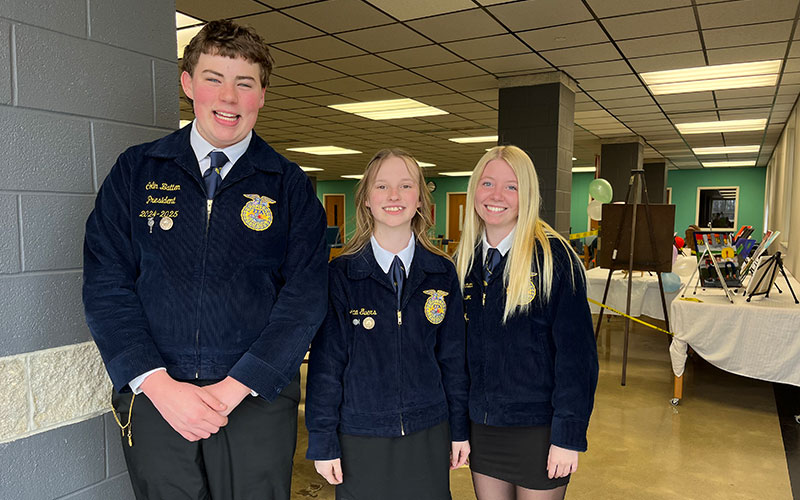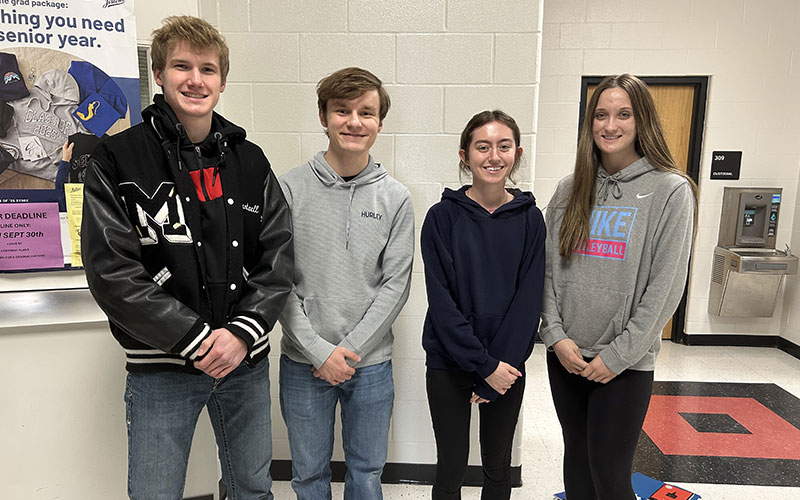
by CrownRandall | Mar 14, 2025 | Agriculture
I hope this Newsletter finds you well. Darke County has been having some warmer, comfortable weather recently, reminding us that we aren’t very far off from working in outfields and gardens (https://droughtmonitor.unl.edu/CurrentMap/StateDroughtMonitor.aspx?fips_39037). Ohio weather can be unpredictable, but hopefully, we won’t have much more cold weather before spring officially arrives.
HPAI in Darke County and the surrounding region continues to be an important topic, with a current number of 21 affected premises in Darke County and roughly 14.6 million birds affected throughout the state. Continue using proper biosecurity measures when working with backyard flocks. More information on biosecurity, as well as the latest numbers of Bird Flu, can be tracked at the ODA website: https://agri.ohio.gov/divisions/animal-health/hpai/01-poultry
The next Darke County Garden Roundtable will be March 20th at 6:00 p.m. The agenda for the Roundtables is attached.
The next Darke County Ag Breakfast will be March 21st at 7:30 a.m. at Jack’s Cabin in Greenville.
This week’s Newsletter topics include:
Considerations for Perennial Grass Species in the Pasture
Dairy Margin Coverage
New Year’s Resolutions for Cow-Calf Producers
Ohio Box Tree Moth Quarantine
Ohio Fruit News
Using Cereal Rye as a Cover Crop
I hope you enjoy this week’s Newsletter, and as always, never hesitate to reach out to me and let me know how I can best serve you and all of Darke County.
by Caden Buschur, Darke County Extension Educator

by CrownRandall | Mar 14, 2025 | Agriculture
Considerations for Perennial Grass Species in the Pasture: “One result of the drought of 2024 may be the need to reseed pasture or perhaps perennial grass hay fields. During the second session of the Ohio Virtual Beef School on February 26, 2025, Noble County OSU Extension Educator Christine Gelley reviewed selection criteria when considering which grass forage species to include in new seedings.” Maintaining a quality pasture an restoring it when necessary is an important practice for producers with grazing livestock. OSU Extension Educator Christine Gelley has a video presentation recorded to explain selection criteria when choosing which grasses might be worth planting in your pasture.
https://u.osu.edu/beef/2025/03/12/considerations-for-perennial grass-species-selection-when-reseeding-pasture/
Dairy Margin Coverage: “The dairy industry is a global market with a history of volatility in profits from income (milk price and the beef market) and expenses (feed prices). We have already seen this volatility in the futures market for 2025 as the potential impacts of tariffs, other changes in global trade and federal order reform are factored in as new information arises.” Dairy production, like all sectors of agriculture, can be quite volatile in terms of economic return and the cost of production. OSU Extension Specialist Jason Hartschuh discusses risk management strategies for dairy producers in this article—in particular, he discusses Dairy Margin Coverage (DMC). Hartschuh shares details on the current DMC outlook, including price points, deadlines, and other considerations.
https://www.farmanddairy.com/columns/managing-risk-on-dairy farms-with-dairy-margin-coverage/861355.html
New Year’s Resolutions for Cow-Calf Producers: “The Top Ten New Year’s Resolutions, first published in January 2022, serves as a good reminder of the management practices that almost always need fine-tuning in cow/calf operations.” New Year’s resolutions are common practice for many people, and some people find them useful for helping to make improvements in their lives. Cow-calf producers might find similar success implementing New Year’s resolutions for their beef operations. In this article, Dr. Michelle Arnold, Ruminant Extension Veterinarian for the University of Kentucky, writes on some options to consider.
https://u.osu.edu/beef/2025/03/12/the-top-ten-new-years resolutions-for-cow-calf-producers-2/
Ohio Box Tree Moth Quarantine: “The Ohio Department of Agriculture (ODA) announced yesterday that the box tree moth (BTM) (Cydalima perspectalis, family Crambidae) quarantine zone has been expanded in southwest Ohio. As of yesterday, the BTM quarantine now includes the following counties: Butler, Clermont, Greene, Hamilton, Miami, Montgomery, and Warren.” The Box Tree Moth (BTM) is an invasive insect that has been discussed in the Newsletter previously. The ODA recently expanded the quarantine zone in Ohio; while Darke County is not included in that zone, some neighboring counties are. This article from OSU Extension Educator Joe Boggs can help keep you up to date on this matter.
https://bygl.osu.edu/index.php/node/2460
Ohio Fruit News: “Fungal diseases of specialty food crops such as strawberry, apples, grapes and vegetables are routinely managed using multiple applications of fungicides. For example, in a single season, more than 10 applications may be made depending on the crop type, cultivar, environmental conditions, and primary inoculum load.” The latest edition of Ohio Fruit News was recently released, with contributions from OSU Extension Professionals Dr. Melanie Lewis Ivey, Dr. Francesca Rotondo, Dr. Erdal Ozkan, and Dr. Ashley Leach. Topics include calibrating your sprayer, fruit disease diagnostics, fungicide resistance screening, and others.
https://u.osu.edu/fruitpathology/files/2025/03/OFN_FEB_2025.pdf
Using Cereal Rye as a Cover Crop: “The use of cover crops in Ohio has been an important focus of existing and newly created conservation efforts to improve water quality in both the Lake Erie and Ohio River watersheds. One of the more popular cover crop species is cereal rye. This fact sheet reviews cereal rye characteristics, such as the growth habit of the species, differences between cereal rye and other small grains, ideal growing conditions and tolerance for poor conditions, and how to identify the species and avoid its potential negative consequences.” The usage of cover crops in general is becoming more popular, and cereal rye is among the most common choices of cover crop for agriculturalists. This factsheet from OSU Extension professionals Rachel Cochran, Kelley Tilmon, and Sarah Noggle focuses on the use of cereal rye as a cover crop. Specific topics include this plant’s growth characteristics, the benefits it offers, how it compares to other cover crop selections, and how it is best managed.
https://ohioline.osu.edu/factsheet/anr 0168

by CrownRandall | Mar 7, 2025 | Agriculture
MARYSVILLE – On Saturday, March 3rd, Rhylan Broerman, Monica Evers and Colin Batten competed in the State FFA Public Speaking Contest held at Marysville High School.
Monica Evers tied for 2nd place in her room in the State FFA Creed Speaking Contest. Rhylan Broerman placed 3rd in her heat division in the State FFA Beginning Prepared competition. In this division, Rhylan prepared a five to seven-minute speech and answered questions about the topic. Colin Batten placed in the Top 2 in the first heat and placed 4th overall in the State FFA Extemporaneous Contest Public Speaking Contest Pl. Colin was given 30 minutes to prepare a four to six-minute speech and answer questions.
Congratulations to Rhylan, Monica and Colin on their state finishes.

by CrownRandall | Mar 7, 2025 | Agriculture
UNION CITY – On February 4, eight Mississinawa Valley MVCTC-FFA Chapter members participated in the online Farm Business Management CDE. The team was composed of Aldon Edger, Daniel Hartzell, Brooklynn Seubert, Matalin Meyer, Taylee Woodbury, Shelby Fennig, Cayde Neukam, and Allyson Waymire.
When the day of the contest came, they took a 90-question test; half was over general farm business knowledge, and half was problem-solving questions related to Ag business. They had to analyze business decisions and apply economic principles in relation to agriculture.
The team placed 12th in the state out of 104 schools! The team was led by Aldon, Daniel, Brooklynn, and Matalin. Aldon Edger placed fourth in the state out of 1,054 individuals!
Great job to all participants!

by CrownRandall | Mar 7, 2025 | Agriculture
I hope this Newsletter finds you well. After some fairly comfortable weather last week, the conditions since then have reminded us that winter is still here, with colder temperatures and strong winds, as well as some precipitation (https://droughtmonitor.unl.edu/CurrentMap/StateDroughtMonitor.aspx?fips_39037). It won’t be too long before we are able to get back out into the fields and gardens.
HPAI in Darke County and the surrounding region continues to be an important topic, with a current number of 21 affected premises in Darke County and roughly 14.6 million birds affected throughout the state. Continue using proper biosecurity measures when working with backyard flocks. More information on biosecurity, as well as the latest numbers of Bird Flu, can be tracked at the ODA website: https://agri.ohio.gov/divisions/animal-health/hpai/01-poultry.
I will be at Worch Library on March 13th at 11:00 a.m. to discuss Backyard Biosecurity. Here, we will discuss what backyard livestock producers can do to help prevent the spread of disease. I hope to see you there!
The next Darke County Garden Roundtables will be March 12th at 12:00 p.m. and March 20th at 6:00 p.m. The agenda for the Roundtables is attached.
The next Darke County Ag Breakfast will be March 21st at 7:30 a.m. at Jack’s Cabin in Greenville.
This week’s Newsletter topics include:
Calf Health, Nutrition, and Economics
Clover in the Pasture
Growing Jerusalem Artichokes
Spring Planting Outlook
The Impact of a Dry Summer and Hard Winter on Pasture
Top Dressing Wheat with Liquid Manure
I hope you enjoy this week’s Newsletter, and as always, never hesitate to reach out to me and let me know how I can best serve you and all of Darke County.
by Caden Buschur, Darke County Extension Educator

by CrownRandall | Mar 5, 2025 | Agriculture
DARKE COUNTY – The Jr Leaders 4-H club is an opportunity for kids who are 13 years and older who yearn to grow in leadership and to better serve their community. Dedicated to building leaders by teaching valuable skills and community service opportunities, this is a fantastic opportunity for young people who want to grow in the 4-H community.
The Jr Leaders 4-H club is non-project-based, meaning anyone is welcome, with or without having projects signed up. The club is led by Mercedes McFarland, Blake Addis, GraceLynn Harter, and Katie Brown, all with an extensive background in 4-H, full of leadership, project-taking, and community service success. The advisors know how important it is to incorporate community service and leadership skills to 4-H youth projects, resume building, and their lives.
In this club, members will have the opportunity to impact their community by doing simple tasks. At the first meeting, members painted rocks that were hidden all over the Darke County Fairgrounds.
People of all ages were able to find these special rocks and were awarded a little 4-H token, inspiring that 4-H is all about curiosity.
In the next meeting, members got to play games like “Know your Fellow Leader”, games dedicated to getting to know each other better and to help inspire teamwork. Along with games, members filled and decorated lunch bags for First Responders and farmers, showing appreciation for all their hard work. After the meeting, members dropped off their bags to whom they decorated for.
This is just a start for the Jr Leaders 4-H Club. With more recognition and added members, this club can provide members numerous opportunities for community service and leadership skills that they can hold on to for the rest of their lives.




